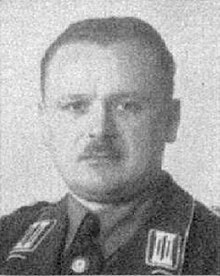Friedrich Peppmüller
Friedrich Peppmüller (born July 7, 1892 in Osterfeld , † June 3, 1972 in Wolfsburg ) was a German politician ( NSDAP ).
Live and act
Peppmüller was born the son of a metal lathe operator. He attended elementary school from 1900 to 1906 and completed an apprenticeship as a lathe operator at Gutehoffnungshütte in Oberhausen from 1907 to 1911 . Until 1913 he worked at Maschinenbauanstalt Thyssen & Co .
In 1913 Peppmüller joined the Imperial Navy , where he worked as a radio telegraph mate. From 1914 to 1918 he took part in the First World War. He was employed one after the other on the ship Württemberg and the cruisers Munich and Karlsruhe . In 1916 Peppmüller took part in the Battle of the Skagerrak . During the war he was awarded the Iron Cross Second Class and the Front Fighter Cross. After the war, Peppmüller earned his living as a Reichsbahn inspector from December 1918. Peppmüller was married twice. His first marriage was divorced in 1930. In the same year he married for the second time.
Peppmüller joined the NSDAP for the first time on April 24, 1923 and then again in January 1926 after the temporary ban. On August 7, 1925, he had already participated in the establishment of the NSDAP local group in Oberhausen and had become local group leader. In the SA , Peppmüller led SA-Sturm 13 in Oberhausen from 1928 to 1930. From November 1929 to 1933 Peppmüller was a city councilor in Oberhausen.
In April 1932 Peppmüller received a mandate in the Prussian state parliament , which he held until November of that year. In November 1932 , Peppmüller was elected to the Reichstag as his party's candidate for constituency 23 (Düsseldorf West) , which he subsequently belonged to until May 1945 without interruption. The most important parliamentary event in which Peppmüller was involved during his time as a member of parliament was the passing of the Enabling Act in March 1933, which formed the basis for the establishment of the National Socialist dictatorship and which, among other things, was passed with his vote.
After the National Socialist " seizure of power " in 1933, Peppmüller was from April to October the Reich Commissioner's agent for civil servants 'organizations and thus responsible for the dissolution of the old civil servants' organizations. In addition, he headed the Bund Deutscher Reichsbahnbeamter and was head of the main office for officials of the NSDAP. From January 1934 until the end of the war he headed the Reichsfachschaft (Reichsfachschaft) of Reichsbahnbeamten in the Reichsbund der Deutschen Officials , was senior councilor in the Reich Ministry of Transport and was a member of the board of directors of Deutsche Beamten-Versicherung , a life and pension insurance company.
After the end of the war, Peppmüller worked as an unskilled worker in the personnel department of the headquarters of the Deutsche Bundesbahn .
literature
- Joachim Lilla , Martin Döring, Andreas Schulz: extras in uniform: the members of the Reichstag 1933–1945. A biographical manual. Including the Volkish and National Socialist members of the Reichstag from May 1924 . Droste, Düsseldorf 2004, ISBN 3-7700-5254-4 , p. 458 .
Individual evidence
- ↑ Christopher Kopper : The railway in the economic miracle. German Federal Railways and Transport Policy in Post-War Society. Campus, Frankfurt am Main 2007, ISBN 978-3-593-38328-6 , p. 48.
Web links
- Friedrich Peppmüller in the database of members of the Reichstag
| personal data | |
|---|---|
| SURNAME | Peppmüller, Friedrich |
| BRIEF DESCRIPTION | German politician (NSDAP), MdR |
| DATE OF BIRTH | July 7, 1892 |
| PLACE OF BIRTH | Osterfeld (Oberhausen) |
| DATE OF DEATH | 3rd June 1972 |
| Place of death | Wolfsburg |
